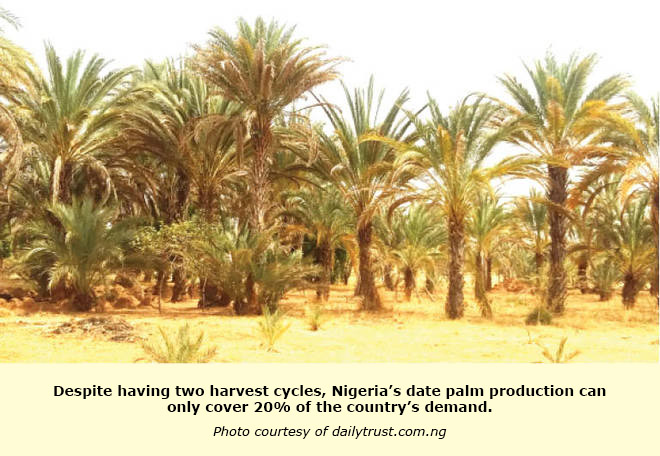Globally, Nigeria is the only country where date palms have two harvesting seasons in a year. Even in North Africa and the Middle East where the fruit originated from, they enjoy only one fruiting season.

Date palm trees enjoy rainy and dry fruiting seasons in the savannah region of Nigeria which covers mainly the North West and North East.
Dates grown in the region start flowering around January/February and become ripe for harvesting around June/July, while that of the rainy season start flowering around September/October and become ready for harvesting around February/March.
However, despite this advantage of double harvesting in a year, the country produces less than 20 per cent of what is being consumed in the country as the remaining 80 per cent is imported.
Speaking to Daily Trust on the cultivation of date in the country, the officer in charge of the Nigerian Institute for Oil Palm Research (NIFOR), Date Palm Research Institution Substation, Dutse, Jigawa State, Hamza Abdulhameed Mohammed, said the institution had come up with variety of seedlings capable of making the country the leading date palm producer in the world.
Mohammed said the institute had produced seedlings of dried, semi dried and soft varieties of date palm and that the seedlings were produced in accordance with the variety of the mother tree.
He said the choice of the type of dates originates from the seedling that one wants to cultivate.
On the date palm producing belt in the country, Mohammed, said apart from double harvesting, high yield of fruiting was also recorded in the country in Kano, Jigawa, Kaduna, Katsina, Sokoto, Kebbi, Zanfara, Gombe, Borno, Yobe, Bauchi, Adamawa and some parts of Taraba states.
He explained that apart from promoting the cultivation of the crop for providing employment for the teeming unemployed youths, it could also be used as mechanism for fighting poverty as date was a cash crop.
On post-harvest storage, Mohammed said dates could be stored for as long as a year or even beyond, provided there is effective storage management, otherwise it could easily be infested by pests.
He noted that the best way to preserve dates is by leaving them on the bunch on layers of wood-supported mesh wire in a well ventilated store, and that under such condition, they could last for more than a year without a problem.
Mohammed further stated that dates easily became infected if kept for long time in close contact with the ground and that they became easily infested because of their high sugar content.
Local silo (rumbu) is another perfect place for storing dates considering the fact that such silo is suspended and its cover allows free movement of air.
Speaking on the challenges associated with the cultivation of date palm, Mohammed said most of the local farmers believe that date palm is a desert crop and as such does not need water. He said this kill farmers’ spirit as eventually the trees hardly grew to fruition.
He stated that despite the fact that date palm does not require much water, it does not mean that at infancy one could not water it, adding that ordinarily, a farmer ought to water his date palm at the beginning for at least two years.
Another challenge in the cultivation of date palm is that of stray animals because of the fact that it is a perennial crop. In some cases, it may be the only available green crop and that makes it vulnerable.
It was also identified that most of the local farmers of the crop do not go for the hybrid seedling.
“Anywhere in the world, date has only one fruiting circle, apart from Nigeria where we have two circles. We stand this advantage because we are situated in a savannah. We have little bit more rainfall than North Africa and Middle East where date palm originated from.
“The date-growing belt in Nigeria is North West and North East, while the North Central is the marginal date-producing zone. If you go to places like Abuja, Niger, Benue and the rest within the North Central, date palm can only bear fruits once a year, and the further you go to the coastal area, the trees can only grow vegetative, but cannot bear fruits.
“You can keep a date fruit for as long as a year, but in places where there are proper storage facilities, the fruit can be stored for two years. A standard storehouse is the one with wooden mesh wire in layers. Weevils are the common insects that destroy dates. Weevils live on the mesocarp of date fruits,” he said.

thank you for the article